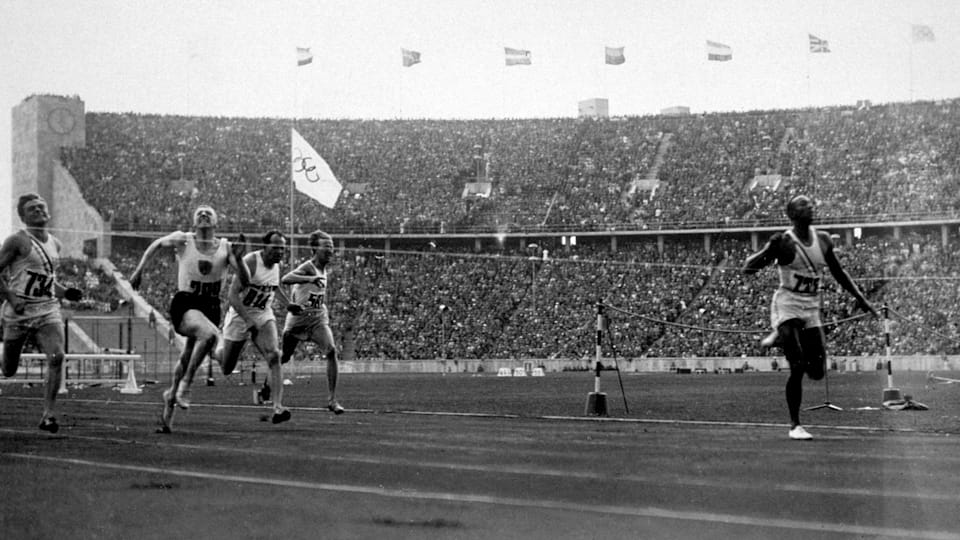Jesse Owens’ quest for glory started with 100m gold
After a long and fraught process punctuated by calls for a full boycott, Jesse Owens joined 65 other USA track and field athletes on the boat to Berlin for the 1936 Olympic Games. Blessed by the ability to focus on what he did best, Owens lined up for his first event, the 100m. What followed was nine days of incomparable Olympic sport.

It is difficult to imagine the burden on Jesse Owens’ shoulders as he stood on the start line on 2 August 1936 for the men’s 100m heats at the Berlin Olympic Games. Competing in an arena adorned with Nazi flags while still the subject of ongoing protests by fellow Americans appalled that their athletes had travelled to Hitler’s Berlin, Owens and his teammates were in a position uniquely challenging in Olympic history.
What is sometimes forgotten is that on top of all this, the 22-year-old was under considerable sporting pressure.
Winning the 100m was the most memorable moment of all - to be known as the world's fastest human being Jesse Owens - Jesse Owens
Owens may have been the 100m world record holder, after running 10.2 seconds in Chicago two months earlier, but the quietly spoken Alabama native was not a nailed on certainty for the blue-riband event in Berlin.
The other-worldly aura he had built up in May 1935, courtesy of one of the most extraordinary feats ever seen in sport – Owens broke five world records and equalled a sixth in the space of 45 minutes at a university meet – had been shaken by fellow Alabamian Eulace Peacock. A one-time American football prospect, Peacock had beaten Owens three times over 100m late on in 1935. A cruel injury suffered in May 1936 meant Peacock was not in Berlin, but countryman Ralph Metcalfe was.
Owens and Metcalfe had enjoyed a long and intense rivalry through college, during which the latter had enjoyed as many successes as the former. And crucially, as a Los Angeles 1932 Olympic Games 100m silver medallist, Metcalfe had already proved he could perform on the biggest stage of all.
Owens later wrote that he felt the pressure gauge was at its most intense for the 100m. The title of being “the world’s fastest human being” was so close and yet so difficult to grasp. Remarkablyit would be impossible to guess any of this from the television footage of Owens’ three heats and the final.
Taught by Charles Riley, junior high track coach at Fairmount Junior High School, to run as though the track was on fire, Owens flew along the track. In the second of his two heats on day one he clocked 10.2 seconds, a time that would have equalled his world record were it not for the strong tail wind. None of his competitors got within two-tenths of a second of the graceful Owens in the opening two races.
With just one German, Erich Borchmeyer, through to the semifinals on 3 August, the unassuming Owens had already started to catch the attention of large swathes of the Berlin crowd. Cries of “Owens” began to ring out before his semifinal. In cold, overcast conditions, the USA sprinter won his race in 10.4 seconds with Metcalfe taking the other semifinal in 10.5 seconds.
The pair, drew opposite sides of the track for the final, Owens on the inside lane two and Metcalfe on the outside in lane seven.
A habitually poor starter, Metcalfe almost stumbled out of the ‘blocks’ – homemade trenches dug in the cinder track by each athlete – and was immediately down on his smooth-flowing teammate. Never troubled, Owens was comfortably clear at 50m and despite a late surge from Metcalfe, the 22-year-old burst the tape in 10.3 seconds.
Metcalfe took a second Olympic 100m silver, finishing in 10.4 seconds with the Netherlands’ Tinus Osendarp adrift in bronze medal position. Germany’s Borchmeyer was down in fifth, just under half a second behind Owens.
The much publicised reports that Hitler refused to acknowledge Owens’ opening victory appear to be untrue, with the German leader reportedly deciding halfway through day one of the athletics programme not to shake any further gold medallists by the hand.
None of this mattered to Owens. The men’s 100m gold medallist had what he wanted.
"Winning the 100m was the most memorable moment of all - to be known as the world's fastest human being," he wrote in later life.
More, much more, was to come.
